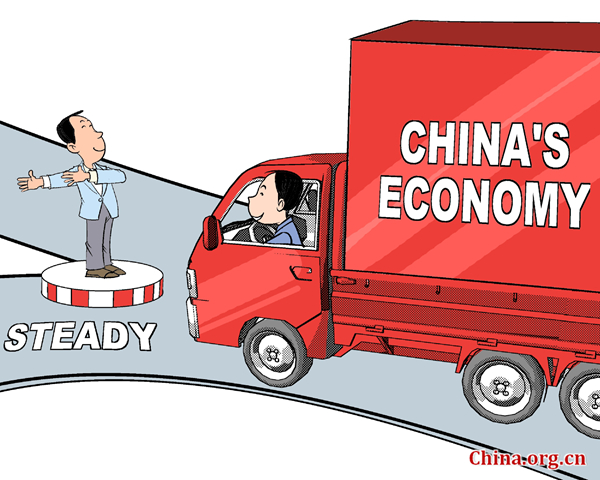Analysis on the current Chinese macro-economy (Part I)
- By Zou Pingzuo
 0 Comment(s)
0 Comment(s) Print
Print E-mail China.org.cn, August 16, 2015
E-mail China.org.cn, August 16, 2015
|
|
|
The right way [By Jiao Haiyang/China.org.cn] |
The current macroeconomic train of thought for the Chinese economy focusing on "fine adjustment" has profound meaning. However, can it solve the problems the country now faces?
Probably not, given that fine adjustment is a gradual process, from system to structure, from quantitative change to qualitative change.
However, decision-makers have not yet understood the deep-seated dangers inside the Chinese economy. Currently, Western economic theory is pushing China to the same path as the Soviet Union.
To turn the situation around, we should make our decisions based on analysis of existing and emerging risks and problems.
Generally speaking, the economy is moving forward, and in terms of productivity, contains plenty of growth opportunities. The upgrade of the machinery equipment industry, such as high-speed railways, has become a significant force. New energy, new materials and new economic forms are breeding new power. Information technology, especially the Internet, has gained astounding growth.
What's more important is that in Beijing, Shanghai, Shenzhen, Hangzhou, Suzhou, Wuxi and other important cities, there has been a big upsurge in innovation and starting new types of business.
In the future, various dividends including system, labor, science and technology, natural resources, internationalization and ecologicalization will promote strong and continuous growth and changes in the economic development mode are creating a new economic system, technology and ways of thinking. Thus, we can expect long-run growth.
However, a range of problems also exist.
Firstly, the macro economy faces panoramic dilemma. In recent years, due to deterioration of the financial structure and decline of financial efficiency, the economy faces three kinds of risks: stagflation; a repeat of the crisis that happened in Southeast Asia; and risks triggered by rising interest rates, worsening family finances and a real estate bubble.
These risks hide within the levels of structure and system. Chinese financial and economic systems and the government share the same structure of "inverted triangle," which is not stable enough for structural adjustment and sustainable development.
In the financial industry, oversized banks are hindering financing development, financial resources are concentrated in state-owned enterprises and governments at all levels, which leave medium, small and private companies struggling for finance in order to grow. The central government grasps more power, while local governments become weaker.







Go to Forum >>0 Comment(s)